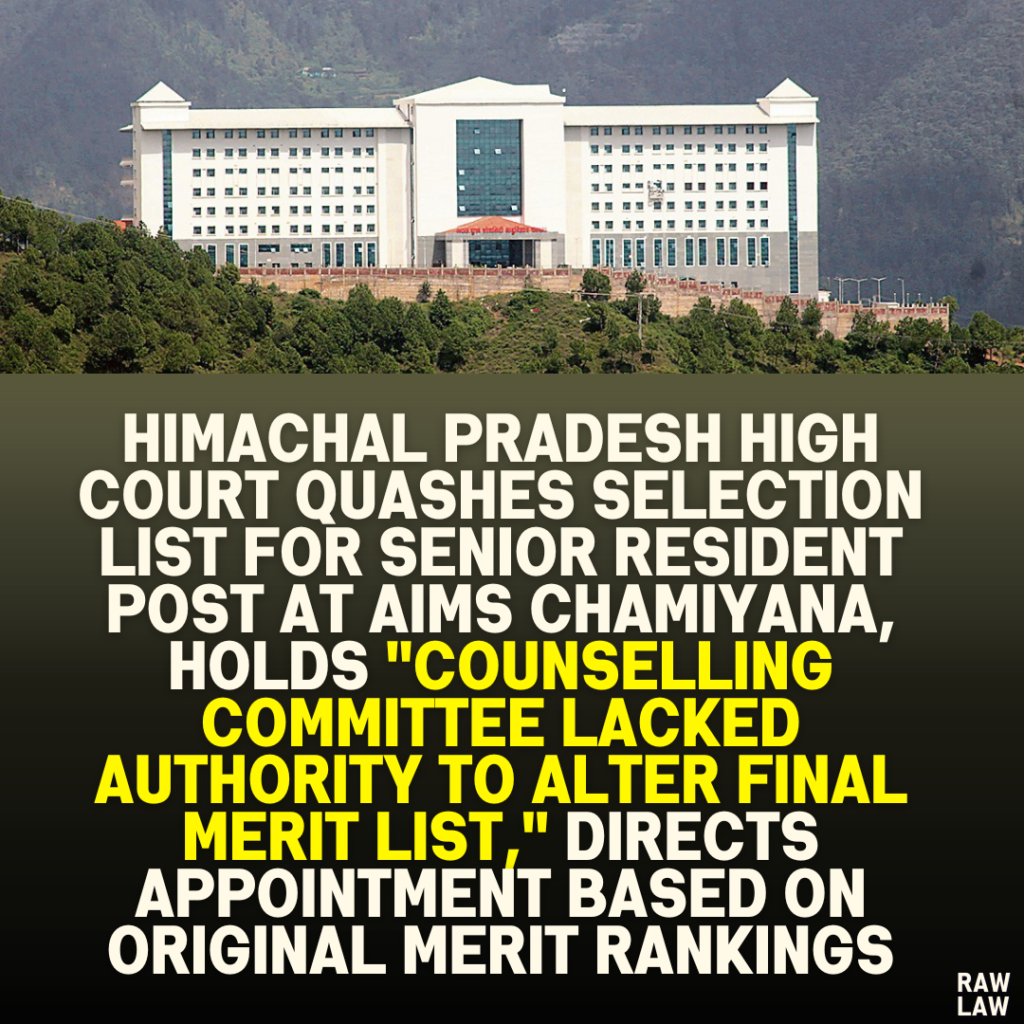Court’s Decision:
The Himachal Pradesh High Court allowed the writ petition and quashed the selection list (Annexure P-8) for the post of Senior Resident in the Department of Microbiology at AIMS Chamiyana. The Court directed the respondents to make the appointment strictly based on the final merit list dated July 30, 2024. The Court emphasized that the Counselling Committee lacked authority to reassess candidates’ merit or award additional marks.
Facts:
- An advertisement was issued on June 21, 2024, inviting applications for Senior Residents at AIMS Chamiyana, Shimla.
- The petitioner applied and was initially ranked higher in the tentative and final merit lists, scoring 61.33 compared to the private respondent’s 61.20.
- Subsequently, the Counselling Committee awarded two additional marks to the private respondent for case reports, altering the final ranking and resulting in the private respondent’s selection.
- The petitioner challenged this revised selection, contending that the Counselling Committee lacked authority to amend the final merit list.
Issues:
- Whether the Counselling Committee had the authority to reassess the merit of candidates after the publication of the final merit list.
- Whether the award of additional marks to the private respondent was legally justified.
Petitioner’s Arguments:
- The Counselling Committee was mandated only to conduct counseling based on the final merit list.
- Reassessing the merit and awarding additional marks post-finalization was beyond its jurisdiction.
- The petitioner argued that the selection process violated the recruitment advertisement’s terms, which prohibited modifications to the merit list after finalization.
Respondent’s Arguments:
- The private respondent submitted representations after the final merit list, claiming entitlement to marks for case reports.
- The respondents argued that the Counselling Committee applied a uniform policy to consider case reports, which justified the reassessment.
Analysis of the Law:
- The Court analyzed the recruitment advertisement, which specified that objections to the tentative merit list could only be submitted within a stipulated timeline.
- No provision allowed modifications to the final merit list or entertained objections after its publication.
- The Counselling Committee’s actions in altering the merit list were found to be ultra vires (beyond their authority).
Precedent Analysis:
The Court distinguished the case from Vikas Pratap Singh v. State of Chhattisgarh (2013), where post-recruitment complaints were addressed due to defects in the examination process. The Court noted that in the present case, there were no defects in the process, and the Counselling Committee’s actions were uncalled for.
Court’s Reasoning:
- The Counselling Committee was formed solely to conduct counseling, not to reassess candidates’ merit.
- The final merit list, published after considering objections, was binding.
- Allowing post-final merit list changes undermines the transparency and integrity of the recruitment process.
Conclusion:
The Court held that the actions of the Counselling Committee were unsustainable in law and quashed the revised selection list. It directed the respondents to appoint the petitioner based on the original final merit list dated July 30, 2024.
Implications:
This judgment reinforces that recruitment processes must adhere to advertised terms, ensuring transparency and fairness. Committees must function strictly within their defined mandates, safeguarding the legitimacy of public selection processes.



